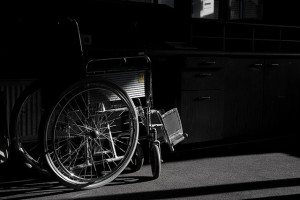

 Ted Kennedy, Jr. was a natural choice to act as surrogate for the Obama administration at the National Forum on Disability Issues (NDFI). The healthcare reform issue that is so crucial to people with disabilities was a lifelong goal of his father, the late U.S. Senator from Massachusetts. And as Kennedy acknowledged in his opening remarks, he himself “joined the community” of people with disabilities when cancer took his leg at the age of 12. He has never run for public office, instead forging a career as an attorney fighting for the rights of people with disabilities; Kennedy is also a teaching fellow on disability policy at Harvard University’s John F. Kennedy School of Government.
Ted Kennedy, Jr. was a natural choice to act as surrogate for the Obama administration at the National Forum on Disability Issues (NDFI). The healthcare reform issue that is so crucial to people with disabilities was a lifelong goal of his father, the late U.S. Senator from Massachusetts. And as Kennedy acknowledged in his opening remarks, he himself “joined the community” of people with disabilities when cancer took his leg at the age of 12. He has never run for public office, instead forging a career as an attorney fighting for the rights of people with disabilities; Kennedy is also a teaching fellow on disability policy at Harvard University’s John F. Kennedy School of Government.
But in addition to sending Kennedy to Columbus, Ohio, President Obama did make an appearance in the form a new video, which tailored his campaign messaging toward the concerns of the NDFI audience and set the stage for the civil rights framework that Kennedy’s presentation would take. The video begins around the 1:20 mark of this YouTube clip of Tony Coelho’s introduction of Kennedy.
More was certainly known about how the Obama administration would approach issues facing people with disabilities heading into the NDFI than his opponent on the GOP ticket, Mitt Romney. In response to moderator Frank Sesno’s first question about concern among people with disabilities that the President’s employment bill did not include provisions for this population, Kennedy recounted several strategies the current administration has undertaken, including the Wounded Warrior tax credit, an executive order directing federal agencies to employ 100,000 people with disabilities by 2015, the Labor Department’s Add Us In initiative for small businesses and the Office of Federal Contract Compliance Policy’s proposed rule requiring federal contractors to track recruiting and employment of these individuals. Kennedy also shared a story about how much employment opportunities can make life matter for people with disabilities:
Jamie has a severe disability. He was born with cerebral palsy, uses a wheelchair. He had to go to the doctor in the middle of the day, and his wheelchair broke. You know what? He wanted to go back to work so badly that he called an ambulance and had the ambulance bring him back to High Mark… Well, the CEO of High Mark said, you know what? In my 20 or 30 years, I’ve seen a lot of people leave my corporate headquarters in a stretcher. I’ve never seen anyone come to work in a stretcher…And that tells the story of how much people with disabilities want to work.
Sesno’s line of questioning followed a similar arc for both Kennedy and his conservative counterpart, Cathy McMorris-Rodgers — touching on jobs, healthcare, and education and career training opportunities for people with disabilities. Where he pressed the congresswoman from Washington state more on the potential loss of benefits under Romney’s plans with regards to Medicaid and the Affordable Care Act, with Kennedy it was more about the viability of these measures given the federal deficit and how the private sector could become more involved.
In other words, the exact debate being played out on the national stage. (Although you wouldn’t have known it from watching last Thursday’s vice presidential debate, where neither Joe Biden nor Paul Ryan made a single mention about the impact of their policies on people with disabilities.)
But when it came time to make his closing remarks, Kennedy turned back to his civil rights roots and said the most important fight for people with disabilities right now is making sure their voices are heard in the halls of government:
… [W]e are here because for years and years, people with disabilities, we talked a lot, but we didn’t go out and register to vote. Okay? Voting is the political currency. We don’t have a lot of money in the disability community. What we have is our voice and our vote. So I encourage everybody in this room, study the issues… [Y]ou become the judge, and you become informed about the issues, and you go and tell your friends and neighbors that these issues are important to me.
Here are links to Ted Kennedy, Jr.’s opening remarks and part one and part two of his Q&A. Use the Comments section below to share any thoughts you have about his or Cathy McMorris’s presentation, or about the 2012 NDFI in general.
Image by Marcel Oosterwijk.
[…] At the NFDI, Ted Kennedy, Jr. said the most important fight for people with disabilities is making sure their voices are heard in the halls of government. […]